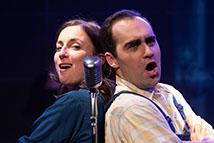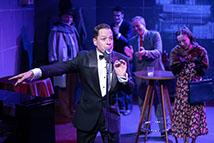Rogue Machine Theatre continues its look back at American leftists - and the persecution of them - with Finks, which alternates onstage at Venice’s Electric Lodge with the peerless Oppenheimer. If the latter recounted the saga of the physicist who co-invented the atomic bomb and leftwing ties in the scientific community, Finks focuses on show biz radicals during the witch-hunt of the House Un-American Activities Committee/McCarthy era during the 1950s.
In Finks playwright Joe Gilford dramatizes the blacklisting of his real life parents. Jack Gilford played Hysterium in 1966’s A Funny Thing Happened on the Way to the Forum, acted in 1985’s Cocoon was Oscar-nominated for Best Supporting Actor in 1973’s Save the Tiger and is here called Mickey Dobbs (the inimitable French Stewart).
Jack’s wife, stage, radio and screen actress Madeline Lee, appeared in The Goldbergs; I Remember Mama; on the Jackie Gleason and Red Buttons shows, specialized in playing babies and children and in Finks is named Natalie Meltzer (Valerie Claire Stewart).
Although as a film historian I’m knowledgeable about the Hollywood Blacklist I learned a lot in Gilford’s two-acter, in particular how this entertainment industry purge affected East Coast talents. As Finks opens in the early 1950s, Mickey - a WWII Marine who fought at Okinawa - is a comedian performing at New York night clubs who gets a shot at a network TV series. His jibes jab at politicians but Mickey probably isn’t a card carrying Communist Party member.
Natalie, on the other hand, is a committed activist/actress who organized the Actors Faction (or something like that) with Bobby Gerard (Adam Lebowitz-Lockard portrays the closeted gay choreographer suggested by Jerome Robbins of West Side Story fame). Although she’s married Natalie falls for Mickey and arranges for him to perform at leftwing fundraisers. In this way Mickey, who appears to have progressive instincts, gets pulled into the Communist Party orbit and becomes a “fellow traveler” - somebody who may have moved in the same circles as dues paying Reds and was sympathetic to the Communist Party line.
Eventually, HUAC, Red Channels (a rightwing “guidebook” of sorts to purported show biz “commies”), etc., close in on Mickey, Natalie and their friends. They are forced to testify before HUAC about their leftist politics and ties and to “name names” of other suspected Reds - often including their close friends. Gilford’s skillfully constructed first act builds up to what the characters will do under pressure when they are subpoenaed to appear before the congressional grand inquisitors in act two.
The excellent play makes a number of important points. First of all, one didn’t have to be an actual Communist Party USA member to be blacklisted - or even a leftist, per se. To be forbidden from working in the entertainment industry, a witness merely had to be “unfriendly” - that is, refuse to be an informer and name names of others who may have attended a fundraiser for the Spanish Republic in the 1930s (as is depicted in scene 1 of Oppenheimer) or marched in a May Day parade or attended a meeting for friendship between the USA and USSR or organized for unions, etc. As said, Mickey does not necessarily seem to have signed a CPUSA membership card, but he’s implicated by bookings at leftwing functions (which really happened to Gilford’s future Forum co-star Zero Mostel, who HUAC hounded, among other things, for performing a butterfly at rest at CP-related events).
BTW, the anti-racist, pro-labor Natalie may indeed be far more devoted than her vacillating boyfriend, who doesn’t want to lose his shot at the big time with his own television show, but it is not conclusively stated onstage that Natalie belongs to the Party either. In any case, if she was - like all Americans - Natalie had a constitutional right to join the CPUSA, as their political party was perfectly legal.)
Another significant point that Joe Gilford illustrates with Mickey’s political jokes is that today, comedians such as Stephen Colbert, SNL, Trevor Noah, Seth Meyers, etc., are in the vanguard of the anti-Trump opposition. An astute observation.
To tell his tale, Gilford, who has a screenwriting background, uses a stage version of the cinematic technique of montage to intercut between HUAC testimony (some of it ripped from the congressional transcripts or inspired by different witnesses’ statements on the stand) and Mickey performing his shtick and other action. This theatrical editing and melding is very effective. Some projections - especially of HUAC hearings, which had a circus-like atmosphere - by designer Nicholas Santiago are sparsely shown on the Electric Lodge’s walls, but a more ambitious use of projected still and even moving imagery could enhance the drama even more.
Proving that payback is a bitch, it’s interesting to note that while the names of the persecuted artists are changed (to protect the innocent?), the real monikers of the persecutors (such as HUAC’s Torquemada Rep. Walter, played by Matt Gottlieb) and of the “friendly witnesses” or finks who collaborated and named names are used (to prosecute the guilty?). Thomas Fiscella portrays screenwriter Martin Berkeley, who sang like (and was as yellow as) Tweety Bird, giving the Committee more than 150 names. Fiscella also plays the “cooperative witnesses” actor Lee J. Cobb and screenwriter Budd Schulberg. Also in a multiple role, Daniel Dorr depicts director Elia Kazan, who is referred to as “the quintessential informer” of the Blacklist in Victor Navasky’s classic book Naming Names. Kazan and Schulberg made a movie that justified informing, 1954’s Oscar-winning On the Waterfront, with the protagonist played by Marlon Brando a stool pigeon who testifies and Cobb, the true life friendly witness, as a fictional character named Johnny FRIENDLY.
On the other hand, Bruce Nozick portrays an unfriendly artist who rather heroically decides to defy the Committee. Although called “Fred Lang,” he seems to be a composite character whose defiant HUAC testimony is reminiscent of the bold words of actors Howard Da Silva, Lionel Stander and perhaps Zero Mostel. Of course, Finks builds up to Natalie testifying before HUAC. In real life, Madeline Lee’s feisty testimony is among the most courageous and valiant to be hurled at the witch-hunters (see sidebar). On Oct. 27, 2017 - the precise 70th anniversary of the first member of the Hollywood Ten to testify in 1947, John Howard Lawson - Madeline’s daughter and Joe’s sister Lisa Gilford joined other actors, activists and relatives of talents persecuted during the Blacklist and reenacted her mother’s gallant testimony. Lisa was truly one of the highlights of the 4-hour plus Hollywood Blacklist commemoration I wrote and co-presented at the Writers Guild Theatre and which C-SPAN recorded and aired (www.c-span.org/video/?436033-1/hollywood-blacklist-70th...commemoration).
The second act in particular has some twists and turns that I didn’t see coming - as to who would name names and who would resist the inquisition. There’s really no question how Natalie will testify when it’s her turn to take the witness stand. It may be no mystery, but will Mickey become a mouse - or, rather, a rat fink? Will he be like Woody Allen’s character in 1976’s The Front - made by and with blacklisted artists - and stand up and speak out strong? Or will he pull a Kazan in order to save his pending TV series? Inquiring minds want to know!
Alternating between high drama and low comedy, French Stewart is stellar as a good-natured man caught in the middle, who has to choose between doing the right thing or saving his career by betraying his friends, as well as his beliefs. It’s fun watching French for the first time acting onstage beside his wife - playing his wife! - Vanessa Claire Stewart, who captures what a firecracker Madeline Lee must have been, whether in bed or on the witness stand. Vanessa co-wrote and co-starred in the Ovation award winning Louis and Keely: Live at the Sahara and also wrote Stoneface: The Rise and Fall and Rise of Buster Keaton as a birthday present for her husband to star in, both originally mounted at Sacred Fools. This scribe/actress certainly has an affinity for bringing show biz personalities back to life and what a kick to see the Stewarts act together, especially in portraying another entertainment industry couple.
In Finks Mickey wonders why he’s risking his career to take a stand against censorship, but Natalie points out it’s so their child growing inside her will know that her father wasn’t a fink, but a mensch, who acted with integrity, guts and honor. Now, that all grownup son has had his say on the matter in one of the best plays of the season. Michael Pressman, whose father David was also blacklisted, adeptly directs his ensemble in eliciting laughs and gripping, tense performances. Richard Levinson’s tickling of the ivories also enhances a wonderful night at the theatre for the Left Coast premiere of a play which was nommed for a NY Drama Desk award and deserves to nab numerous Ovations.
As Trump attempts to strip CNN’s Jim Acosta’s White House press credentials, a Mickey Dobbs-like comedian is removed from the roster of the annual White House Correspondents’ Dinner, Trump invokes Sen. McCarthy’s fascistic henchman Roy Cohen and denounces the press as “the enemy of the people,” unfortunately, although they are largely set in the 1940s and 1950s, L.A.’s most timely plays to see are Finks and Oppenheimer. And that’s NOT “fake news,” as the battle against censorship and political persecution persists in the land of the free and home of the brave.
Rogue Machine Theatre’s production Finks alternates with Oppenheimer through December 30 at the Electric Lodge, 1416 Electric Avenue, Venice, CA 90291. For ticket info: (855)585-5185 or https://www.roguemachinetheatre.net/.
L.A.-based film historian/critic Ed Rampell is co-author/author of four movie film history books, including “The Hawaii Movie and Television Book” (see: https://mutualpublishing.com/product/the-hawaii-movie-and-television-book/ ). Rampell is co-presenting a screening of Dalton Trumbo’s “Johnny Got His Gun” 7:00 p.m., Thursday, Nov. 29 at
The L.A. Workers Center, 1251 S. St. Andrews Place, L.A., CA 90019 (near the intersection of Pico and Western, just north off of Pico).
SIDEBAR: MADELINE LEE’S HUAC TESTIMONY
In August 1955 the daring Madeline Lee Gilford testified before the House Un-American Activities Committee. Madeline’s attorney was Leonard Boudin, who also defended Paul Robeson, Daniel Ellsberg, Dr. Spock and Philip Berrigan. Frank S. Tavenner was HUAC’s chief counsel. Here are excerpts from the HUAC testimony of this spitfire portrayed by Vanessa Claire Stewart in Finks:
...MISS LEE: I don’t want any assumption that my attorney or anyone can dictate my answers here today, and they are dictated by my conscience and under the most severe pressure on the part of your subpoena servicer in an attempt to get me to deliver false testimony, and I am making the charge that this committee coerces witnesses, and goes and has subpoena servicers saying — are you interested in the fact that my testimony has been tampered with before I arrived here today? ...and that is true of other witnesses. The shoe is on the other foot, and newspaper statements have been issued. Is the committee interested in that kind of pressure? ... the pressure, threats, and bribery and blackmail exercised on witnesses to cooperate with the committee is not of interest to the committee? Am I to take it that way?...
Mr Tavenner: Will you tell the committee whether or not there was a group of persons within Actors Equity or the American Federation of Television and Radio Artists, composed chiefly of members of the Communist Party?
MISS LEE: The Communist label about Communist groups has been stuck on anybody and everybody who organizes against the blacklist in our industry. On the basis of what I am saying here today, I will be punished, and cooperative witnesses rewarded, and that is not a high purpose on the part of a congressional committee.
Mr Tavenner: Now that you have made your speech, will you answer my question?...
MISS LEE: I am declining on the basis of the first amendment, that you are prying into my personal affairs, beliefs, and opinions, and on the basis of the fourth amendment, that this is an illegal search and seizure of my property, and deprivation by due process of law of the only thing I have to sell in this industry — my talent and my good name. I also decline on the basis of the eighth amendment, that this is a cruel and unusual punishment that you are inflicting without due process of law, and on the basis of the fifth amendment, that you may not compel me to be a witness against myself…
This is like a game of tag, where you try to be as candid as possible, and three Congressmen are standing there waiting to say, “You waived your privilege.” That is not fair...
...You know, every November I go into a little booth, and I mark a secret ballot, and I prize that very highly as part of the American way of life, and I believe that that question relates strictly to that.
Most people know from my public activities, and as you can see, I am a very talkative person, and very willing to state my opinion, but not under compulsion, and to a nefarious purpose on the part of this committee.
Divulging any political belief under compulsion is not a good American principle.
Is pressuring a witness so that he will not be employed, a part of the congressional direction?
Mr Tavenner: I want to ask you a question.
MISS LEE: I am asking you a question, Mr. Tavenner!



